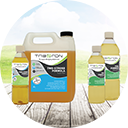Research shows that Triboron reduces friction with up to 50 percent
Pressrelease11 October, 2015
Triboron’s friction-reducing abilities took the centre stage at the 42nd Leeds-Lyon Symposium on Tribology in the beginning of September 2015 when Petra Olander presented new research by the Ångström Tribomaterials Group at Uppsala University to an international audience.
The tests, which were performed to understand the mechanism behind the remarkable fuel savings in road tests, resulted in up to 50 percent lower friction when Triboron was used.
Results from the following chemical analyses showed that low amounts of boron and oxygen was present in the wear tracks from the experiments as well as on the piston ring from road tests. This suggests that a thin layer of boric acid is formed and works as a solid lubricant.
“This research confirms the two cornerstones of our technology. By reducing mechanical friction Triboron can cut fuel consumption in a car by 3 to 5 percent. Furthermore, the technology interacts with the metal surfaces and forms a lubricating and protecting micro-layer inside the engine,” says Thomas Lindskog, Triboron International’s chief executive.




